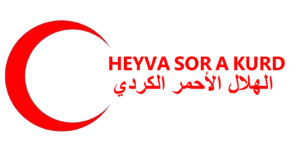Manbij- a Living Example for primary Health Care
/0 Comments/in Development, Health, Reports/by Sozdar
Primary health care/PHC/ services target the needs of individuals, families and communities containing health and well-being in their comprehensive and interrelated physical, psychological and social aspects. It provides lifelong health care to the person as a whole, not limited to some specific diseases.![]()
The /PHC/ guarantees getting comprehensive health care access for all people starting from counseling, prevention, treating, rehabilitation and palliative care. Currently, it plays the crucial role in managing the main reasons and risks for the bad health and well-being, including the new obstacles that could get them worse in the future. In addition to decreasing the cases that need hospitals and achieving the sustainable development aims concerning health and comprehensive health coverage.
![]()

To meet people needs and starting from the main health aspects, KRC dedicated a large portion of its services to provide PHC through 45 medical points distributed in cities, camps, hospitals, and mobile clinics in all NES. However, there are many departments (health educating, internal clinic- pediatrician- gynecology- Obstetrics- Leishmania-Labs- primary psychological clinic or psychological support- emergency)
Manbij center is a good example of providing primary health care to the locals and its countryside for more than three years. Ms. Malik Qassem, team leader, summarized the outcome of this center.

- Tracking epidemics-Corona virus- through triage chamber (this room recognizes the infected people before disease worsens, then they are directed to get the appropriate treatments)
- Tracking social issues (poverty that leads to malnutrition) through conducting visits to the center beneficiaries
- Following up chronic diseases
- Tracking environmental issues which may lead to mass medical cases such as diarrhea caused by water pollution.
In developed countries, such centers usually provide health-care service, but because of the current exceptional circumstances, our centers are providing wider health care, which burdened us with more tasks.
Qamishlo Road Lighting Project
/0 Comments/in Development/by Sozdarthe awareness month of World Breast Cancer
/0 Comments/in Awareness campaigns, Development/by Sozdar
Annually, there are about 1.38 million new infected cases and 458,000 deaths due to breast cancer
(according to website Globocan estimates2008,the International Agency for Research on Cancer).
Breast cancer is one of the most common cancers among women in the advanced and developing countries alike.
In recent years, cancer rates have been shown to be rising steadily in low- and middle-income countries, due to average life expectancy, higher rates of urbanization and adoption of Western lifestyles.
To this moment, the causes of breast cancer are not known so, the early detection is still a cornerstone to fight against the disease .
October is an awareness month of World Breast Cancer and with the passage of a year since the opening of the Kurdish Red Crescent Center for Early Detection of Breast Cancer on 8/10/2019 , a special committee of awareness and education started an awareness program about the disease, which will last for a full month, through several topics on prevention, methods of follow-up and cyclic checkup.
The center where locates in the western neighborhood in Qamishlo city, receives cases by a special team consiste of nurses, a radiologist and a psychological support department that help them to overcome the difficulties and fear of disease and how to behave with the treatment phase in the event of infection.
Since the last year, the center of the developed Mamograph device received about 951 cases of detection included six infected cases.
The Kurdish Red Crescent is training on the Ewarn system
/0 Comments/in Development/by heyvasorakurd
The Kurdish Red Crescent’s monitoring department continues to organize the general policy of its department also add studies and epidemiology departments . Recently, EWARN has been recognized in the north-east of Syria and Rojava, to add to the program of the monthly report (morbidity report).
We expect that these data will be collected periodically (daily, weekly, monthly) from most 20 points in all centers of the Kurdish red Crescent in all the cities and camps of Al-jazera and other points in Al-Shadadi and Deir Al-Zour countryside. This data will be sufficient to build objective studies and activate our early warning to get faster and better response also to prevent the spread of epidemic diseases
Reports and studies will be shared with all health authorities in northern Syria and also with WHO

Distributing (527) food baskets in Bareeka camp – Sulimania / Kurdistan Region
/0 Comments/in Development/by heyvasorakurd
On 17 / 1 / 2019, Kurdish Red Crescent in Sulimania, supported by Support and Sustain Children organization and in coordination with JCC, UNHCR, WFP and the administration of Bareeka camp, distributed (527) food baskets on Syrian refugees in Bareeka camp. Each basket contained (12) food items and the number of beneficiaries reached (2308) individuals.
Kurdish Red Crescent are going to continue with distributing these baskets to cover the remaining list of high vulnerable Syrian refugees according to UNHCR’s assessment in this camp.
Support for displaced people in northern Raqqa
/0 Comments/in Development/by heyvasorakurdTo response to Raqqa offensive, our team in Kobane and GireSIpe distributed Hygiene Kits for more than 1500 families those were displaced from Raqqa City.
The distribution areas were the camps and the villages northern Raqqa those hosted the IDPs , this operation were in coordination with UPP NGO and will be followed up until the end of March,
Our teams in Kobane and GireSipi are covering the health sector of the displaced people as well, through(Primary health care) mobile clinics in the north countryside of Raqqa and the camp,as well as (Secondary health care) through our fixed clinics and Hospitals in Kobane city






Headquarter addresse
Qamishlo city /Al-Antarya neighborhood
Email addresses
Covid-19 Hotline
A1- 00963 935 288 541
A2- 00963 949 359 179
A3- 00963 949 356 870
A4- 00963 932 125 933

